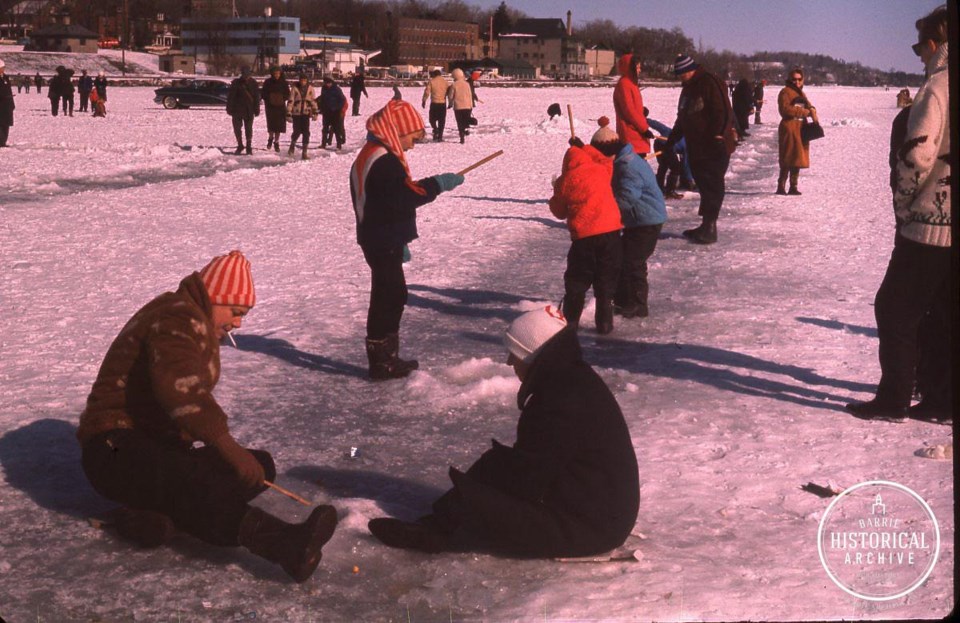Ice and fishing. These two words combined make for an activity that doesn’t appeal to me one bit.
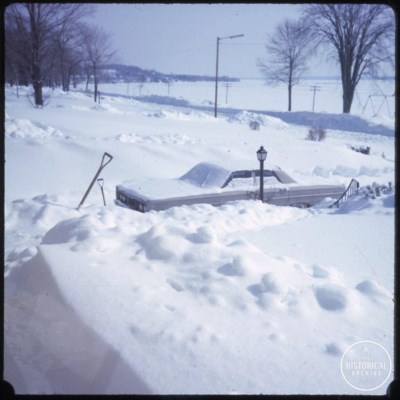 Kempenfelt Drive looking out at the bay, after a snow storm in March 1965. Photo courtesy of Barrie Historical Archive.
Kempenfelt Drive looking out at the bay, after a snow storm in March 1965. Photo courtesy of Barrie Historical Archive. This summer-lover would prefer not to sit in the cold, and not to put sharp hooks into the mouths of lake creatures, but I know that lots of hardy souls up and down the shores of Kempenfelt Bay have embraced ice fishing for years, for centuries actually.
What started as a necessity for First Nations people and early settlers, became a beloved pastime, and Kempenfelt Bay, with its deep cold waters, was known all around for great fishing.
On January 26, 1922, the Barrie Examiner made mention of the seasonal ‘mushroom town that sprung up over night’ on the thick lake ice.
‘A thousand fish a day are caught by hook and line – not including the big ones – by fishermen in the hundred shanties and more that dot the bay for three miles from Allandale.’ These eager anglers were mainly after the then abundant herring, whitefish and trout.
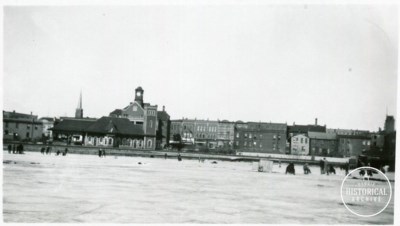 Looking north across frozen Kempenfelt Bay. Circa 1925. Photo courtesy of the Barrie Historical Archive.
Looking north across frozen Kempenfelt Bay. Circa 1925. Photo courtesy of the Barrie Historical Archive. ‘A hole ten inches wide and three feet long is cut in the ice. If it looks like a lucky hole, the shanty is squatted upon it. Piano boxes, roof metal sheeting, drygoods boxes and any old kind of lumber are thrown together for these fish-snaring contraptions. Some have slanting roofs, some have not. Oilburners, wood stoves and coal stoves of the small variety are tucked in, a bench or a chair – two chairs if no bench, for they visit each other like regular citizens – and then the story. What would fishing be without a fish story?’
Ice fishing is not without its perils, as a group of Oro men learned firsthand one terrifying night in early January 1935. Stormy weather never bothered these die-hards much. That afternoon, as they sat snug in their cozy huts, the fishermen were unaware that the ice had cracked near the shore and that strong wind gusts had torn it away and set it adrift out into the lake. The Barrie Examiner set the scene on January 10, 1935.
‘Seven Oro Station and Hawkestone men had experiences Thursday afternoon and night last which they will not soon forget. They were compelled to spend the night on ice floes three miles out in the lake with the temperature dropping to 25 degrees below zero.’
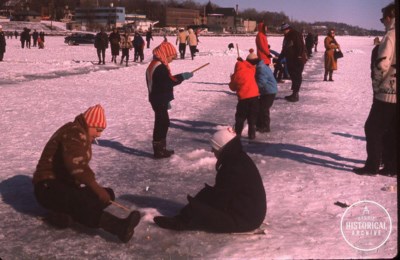 Ice fishing during winter carnival in February 1964. Photo courtesy of Barrie Historical Archive.
Ice fishing during winter carnival in February 1964. Photo courtesy of Barrie Historical Archive. The men, who had been fishing separately, were marooned on three different ice floes. Two of the trapped were Gordon Joslin and Norman Leigh, both 18 of Hawkestone, who had taken a row boat out to make a rescue attempt but found themselves stuck too. After the local folks realised that they were losing the battle, they sent for the provincial police in Barrie, who in turn had to call for a crew of lifesavers from Toronto.
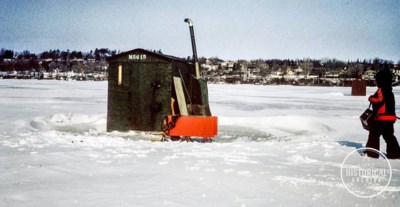 Ice fishing off Johnson's Beach 1975. Photo courtesy of Barrie Historical Archive.
Ice fishing off Johnson's Beach 1975. Photo courtesy of Barrie Historical Archive. Nothing could be done until morning when the sun came up and the gale subsided. At that time, a plane from Camp Borden arrived, followed by another sent by the Toronto Telegram newspaper. The Borden plane dropped food and blankets for the men, while the other plane began picking up one man at a time. Some were rescued by local men, Jack Cuppage and Melville Crawford, who pulled a small boat on a sled out on the newly re-hardened ice and carefully led the fishermen back to shore.
Of their long night on wintry Kempenfelt Bay, one of the fishermen, S.V. Jones, had this to tell the Barrie Examiner reporter:
‘’We never expected to see shore again. The water got within fifty feet of our hut, and when the wind blew the ice flow kept breaking up at the edge, with the water coming closer and closer. “
The reporter added that ‘They had enough fuel to keep a fire going all night, but the fire smoked, driving them out into the 25 below zero weather. Although without food or warm drink for about 24 hours none of the men suffered. The four Hawkestone men spent the night huddled in a hut not much bigger than a phone booth.’
Canadian ice fishermen must be the hardiest of breeds, or a little crazy – maybe both – as the very last line in the news story suggests to me. ‘In spite of their experience, all stated they expected to be out fishing again when the ice hardens.’
Each week, the Barrie Historical Archive provides BarrieToday readers with a glimpse of the city’s past. This unique column features photos and stories from years gone by and is sure to appeal to the historian in each of us.
